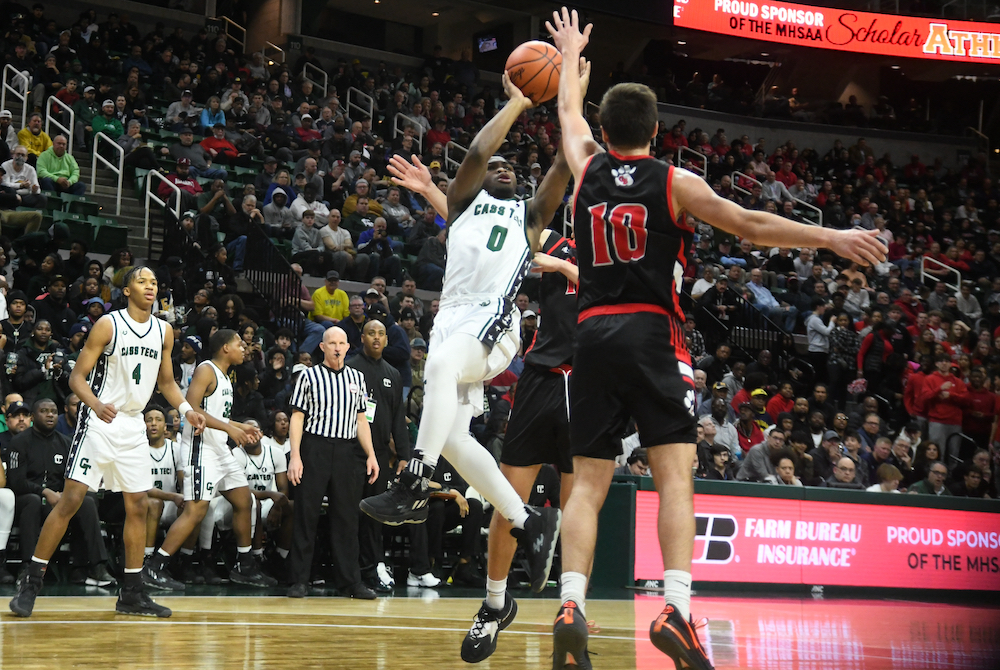
Cass Tech 'Gamers' Force OT, Finish Surge to Reach 1st Final Since 1974
By
Dean Holzwarth
Special for MHSAA.com
March 24, 2023
EAST LANSING – Detroit Cass Tech’s Darius Acuff was held in check for a majority of the second half Friday by Grand Blanc’s defense.
The talented sophomore, however, came up clutch in a pivotal moment.
The 6-foot-2 guard forced overtime with a 3-pointer and then scored four points in the extra period to help lift the Technicians to a thrilling 62-56 win in a Division 1 Semifinal at Breslin Center.
Cass Tech (27-1) will play Muskegon in Saturday’s Division 1 Final.
After Grand Blanc senior Robert Williams made two free throws with 9.1 seconds left in regulation to put his team ahead 54-51, Acuff banked in a 3-pointer in the waning seconds.
It was only his second field goal of the second half after tallying 10 first-half points.
“Once I got open, I called for the ball and I knew I was going to shoot it,” said Acuff, who finished with a game-high 19 points, five assists and three steals. “I knew it was going in.”
The Technicians took control in the extra session.
A breakaway layup by Acuff pushed the Cass Tech lead to 59-56 with 55 seconds to play. He followed with a pair of free throws to make it 61-56.
“We have some gamers on this team, and he doesn’t practice to my liking a lot of times, but when those lights come on I can count on him,” Technicians coach Steven Hall said of his standout sophomore. “The last play out of the timeout that we got a 3 on, they executed it to the T.”
Cass Tech was making its first Semifinal appearance since 1993, and will play in its first Final since 1974, when it finished Class A runner-up.
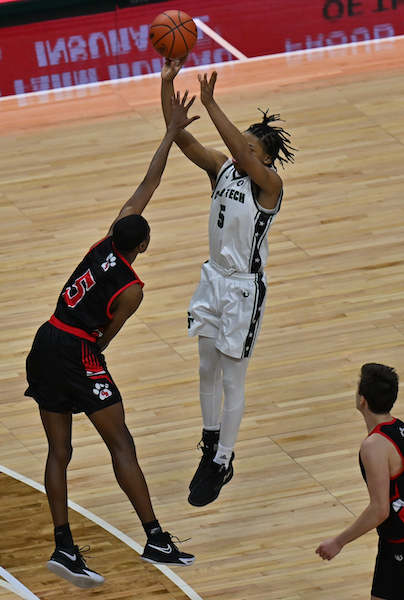
Hall guided Detroit Rogers to three straight Class D titles (2003-05) and returned to his alma mater in 2015-16.
“It’s a wide range of emotions right now,” Hall said. “I’m happy to still be living to fight another day.
“For me, it’s my sixth time here but the first time with my school, and it's a dream of mine. It was a dream of mine for these guys. We came so close last year, and sitting here last year and watching the Semifinals was painful, but I’ve been dreaming of getting here with my school.”
Cass Tech ended a 22-game winning streak by Grand Blanc, which was denied a third-straight appearance in the Division 1 Final.
The Bobcats (25-3) rallied from an early deficit, but committed 18 turnovers for the game and were held to one field goal in overtime.
“We didn’t handle the pressure, and one of the keys of our offensive game plan was limiting turnovers,” first-year Grand Blanc coach Tory Jackson said. “You can't beat great teams like that with 18 turnovers, and we just didn’t handle the pressure like we were supposed to.
“Hats off to Acuff. He’s a tough player and by far one of the best players we've played all year. We got undisciplined at the end, and it’s frustrating because this was supposed to be ours. We left money on the table.”
Cass Tech jumped out to an early 11-4 lead as Acuff scored six quick points.
The Bobcats, however, trimmed the deficit to 17-15 in the second quarter with a 3-pointer in the corner from sophomore Donnie Huddleston.
The Technicians took a slim 26-25 lead into halftime.
Grand Blanc took its first lead, 35-34, midway through the third quarter on an offensive rebound and put-back by junior Anthony Perdue.
Cass Tech has become accustomed to close games.
“That’s us being tough and scrappy,” Acuff said. “It’s always going to come down to one possession, and it came down to that. Once we went to overtime we knew we were going to win, but we knew we had to fight for it.”
Senior Tae Boyd led the Bobcats with 16 points and 10 rebounds, while senior RJ Taylor had nine points.
Senior Kenneth Robertson added 15 points for Cass Tech, and freshman Corey Sadler Jr. added 14 points.
PHOTOS (Top) Detroit Cass Tech’s Corey Sadler Jr. (0) gets up a shot during his team’s Division 1 Semifinal overtime win Friday. (Middle) The Technicians’ Darius Acuff shoots the game-tying 3-pointer at the end of regulation despite the defense of Grand Blanc’s Anthony Perdue (5).
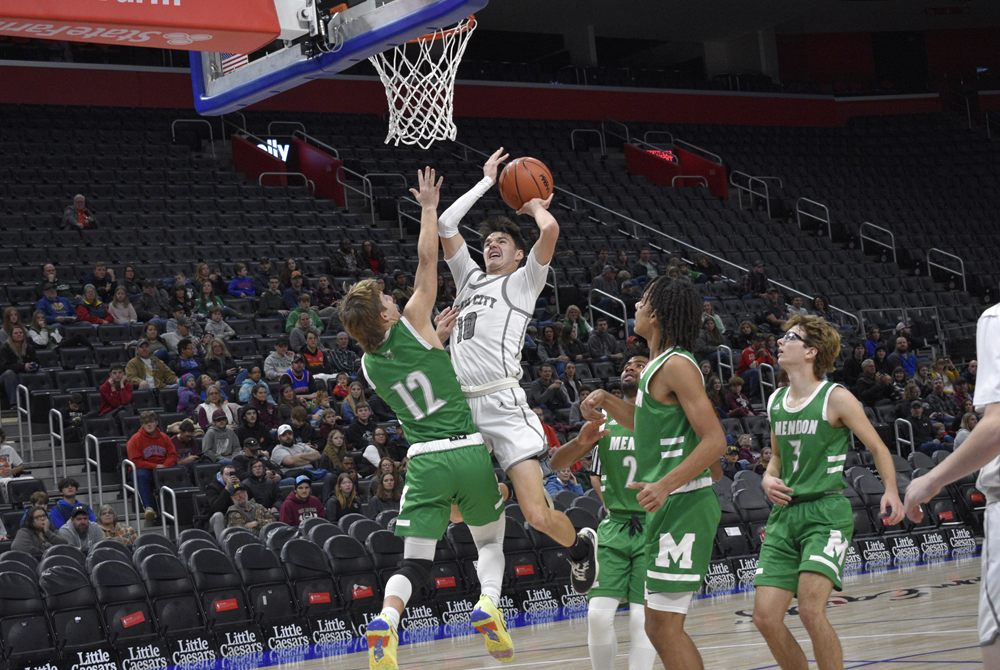
Union City, Mendon Bring Small-Town Matchup to Little Caesars' Big-Time Stage
By
Scott Hassinger
Special for MHSAA.com
January 3, 2024
DETROIT – The annual nonconference boys basketball rivalry game between Union City and Mendon took on a different twist in early December.
 Rather than their usual meeting at the school gym, this year's clash took place on a much bigger stage inside Little Caesars Arena, home of the NBA's Detroit Pistons.
Rather than their usual meeting at the school gym, this year's clash took place on a much bigger stage inside Little Caesars Arena, home of the NBA's Detroit Pistons.
It was Union City posting a 62-45 win over Mendon when the final buzzer sounded on Saturday, Dec. 2. The game capped off a busy first week to the 2023-24 season for the two squads.
Originally, Union City, located in Branch County, and Mendon were supposed to play Tuesday, Dec 5.
However, after replying to a general email over the summer from Brandon Goebel – a senior group sales account executive for the Pistons – Union City athletic director Hayley Denney accepted an invitation to play a game at Little Caesars.
Denney was given the opportunity to choose who Union City wanted to play, and she reached out to Glen Samson, Mendon's AD, to see if the Hornets were interested. Samson readily agreed, and the game was ultimately bumped up a few days.
"We received an email from him (Goebel) with 10 different dates and once we decided, that day just worked out well for both schools, especially with it being on a weekend," Denney said.
"This is a pretty cool event because our teams and kids get to play their game on the NBA court, and the tickets to our game also allowed you to attend the Detroit Pistons and Cleveland Cavaliers game later that same night."
The Union City and Mendon junior high boys teams got to take the court against one another during halftime of the varsity contest.
In addition to receiving a complimentary Pistons item, Union City and Mendon fans also were allowed down on the floor after the Pistons/Cavaliers game to shoot a free throw.
Each school was required to sell at least 125 tickets to the game, and the response in each community was an overwhelming success.
"It was just a unique experience for our kids to play at such a big venue. Our boys spent the night before the game in Ypsilanti, and it was a great team bonding moment. There was great community support for both schools," Samson said.
Union City, a member of the Big 8 Conference, is currently 4-3 overall, including a 2-1 league mark. The Chargers, who are coached by Ben Chard, return a group of seasoned starters with league and District title aspirations after finishing 12-13 a year ago. A league championship would be the program's first since 2008.
Chard believes the thrill and experience of an early-season game played under the big lights at Little Caesars will help immensely with building momentum for the remainder of this season.
"The Little Caesars facility is outstanding. When you step onto the floor, it's very humbling. Our boys certainly embraced the opportunity. They did a great job being grown men and taking the game seriously," Chard said.
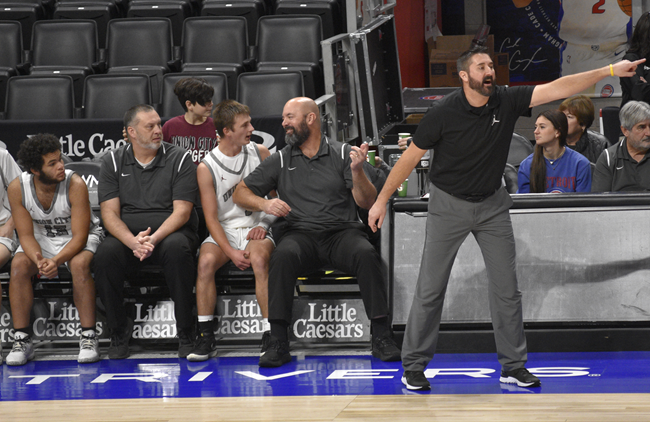
Union City overcame an early 15-4 deficit to gain a sizable halftime lead over Mendon. The Chargers dominated the boards and were able to shut the Hornets down defensively during the second half in pulling out the win.
Union City returns a pair of seniors and three juniors who all started for Chard at one time or another last season. The starting lineup includes junior Rick Austin (6-foot-2) running the Chargers' offense and junior Eli Payne (6-1) at shooting guard, along with senior forwards Jeremy Zehr (6-0) and Nathaniel Maurer (6-3) and junior center Aidan Decker (6-1).
"This is the first time in many years where I've had the luxury of having multiple options to put on the floor," Chard said. "Our seniors work extremely hard, and our junior class is extremely talented. We are very team-oriented with a lot of depth."
Four Union City players scored 10 or more points against Mendon.
Zehr relishes his role on the wing, creating space and shooting from the perimeter.
“Playing at Little Ceasars was insane. You have to play well off the get-go. You can't have slow starts. The way we played against Mendon in the final three quarters is how we play Union City basketball," said Zehr, who aspires to become a business entrepreneur.
"We have huge goals this season. Achieving those will require us to be mentally focused every day in practice, and that requires the seniors to be strong leaders."
Austin has played point guard the majority of his basketball career.
"I like being able to get my teammates open and making good passes,” said Austin, who hopes to continue playing basketball in college and eventually become a game warden.
“We tried to focus on rebounding during the week preparing for Mendon. We want to win the Big 8, Districts and move on to Regionals and see what happens from there."
Emmett Fraley, a former standout at Union City and 2013 graduate, has been a big asset to the program as one of Chard's varsity assistants. Fraley went on to play baseball and basketball at Mount Vernon Nazarene University, an NAIA school in Ohio.
"I played for Coach Chard my senior year. He put a lot of time into helping me, and I wanted to find a way to give back to Union City's program," Fraley said. “This team is capable of success, but you have to be mentally checked in every day. Once you can do that, then the sky is the limit.”
Mendon, 11-14 last winter, is looking to turn things around after joining a new conference.
After competing in the Southwest 10 Conference for several years, the Hornets joined the Southern Central Athletic Association's West division at the start of the current school year.
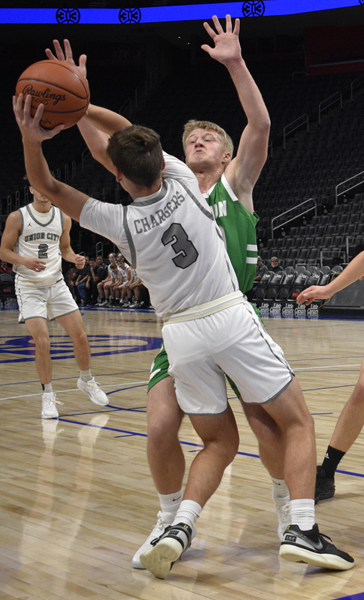 Mendon head coach Danny Schragg, a former prep basketball standout and previously the head coach at Burr Oak, knows what it takes to compete with the top teams in the SCAA.
Mendon head coach Danny Schragg, a former prep basketball standout and previously the head coach at Burr Oak, knows what it takes to compete with the top teams in the SCAA.
The trip to Detroit from St. Joseph County has helped Schragg's Hornets grow closer.
"It was very exciting to be out there, have some fun and take it all in. It was a good overall experience. Union City had size on us and worked us over on the boards. We had some trouble scoring the ball, but we've learned a lot about our team since that game," Schragg said.
"As a team, we want to continue building that bond. We have 10 guys on our roster. It will take everyone playing together to win games. We have some talent, and I think we can win a lot of games in this league. We are young and play a lot of sophomores. I'm hoping down the road we can come together well as a team. We preach effort all the time, and are using our athleticism to our advantage."
Mendon has a pair of returning seniors in shooting guard Jack McCaw and post player Dylan Cupp. Schragg expects heavy contributions out of those two both on the court and in leadership roles.
"Jack is our top defensive player, but he can also fill the basket up offensively. Dylan has moved into a starting role and needs to score more. We need them to average double figures, along with one of our sophomores Ryder Gorham," Schragg said.
"The new conference is good for Mendon. We've gotten smaller over the last two or three years. It will be a great league with us facing schools more our own size. We will be competitive and match up better with these teams. This team is quick, and I think we can compete for a division title."
McCaw, a three-year letterwinner, plans to attend Western Michigan University to further his education in physical therapy and play lacrosse for the Broncos program in the Men’s Collegiate Lacrosse Association.
A standout tailback and leading rusher for Mendon's football team, McCaw helped lead the Hornets to the 2022 8-Player Division 2 Final at the Superior Dome in Marquette.
While McCaw has played in several big football games, he stated the experience of playing basketball in a big venue like Little Caesars Arena was equally rewarding.
"I've watched a lot of NBA games, but I never thought I'd actually get a chance to play in a game on a professional court," McCaw said.
"I'm just here to have some fun and help our team go as far as we can in my final season. There seems to be some good basketball teams and individual players in our conference."
But lacrosse always has been one of McCaw's favorite sports. He has played midfielder on The Bandits, a youth travel team out of the Portage/Kalamazoo area.
Through his participation in lacrosse, McCaw has struck up a strong friendship with Justin Shipp, the head men's lacrosse coach at WMU. Shipp officially has extended an invitation to McCaw to join the Broncos' varsity roster.
"I've played lacrosse for about seven years, and it's one of the sports I'm best at. I play midfielder, so I play offense and defense and I'm always running," McCaw said.
McCaw sees parallels in lacrosse that help him on the football field and basketball court as well.
"Lacrosse really helps me with my defense in both football and basketball. In lacrosse, you must have your stick down, be able to shuffle and keep your guy in front of you because if you don't they will score on you. It also helped me see the holes better to run through for a touchdown or a layup in basketball," McCaw said.
Cupp, who begins his third season on varsity, is one of the most versatile players on Mendon's roster.
"I can play any of the five positions on the floor. It just depends on who is in the game at that particular time for our team," Cupp said. "We're kind of a young team, so I'm working as hard as I can to help those guys to make them better and build the future of this program."
Cupp plans to attend Central Michigan University to study accounting.
"I learned a lot about basketball from alumni in open gyms. Playing at Little Caesars Arena was a big deal to us,” Cupp said. “Before the game, your legs are shaking when you walk down to the arena, but once you start its just like any other game."
 Scott Hassinger is a contributing sportswriter for Leader Publications and previously served as the sports editor for the Three Rivers Commercial-News from 1994-2022. He can be reached at [email protected] with story ideas for Berrien, Cass, St. Joseph and Branch counties.
Scott Hassinger is a contributing sportswriter for Leader Publications and previously served as the sports editor for the Three Rivers Commercial-News from 1994-2022. He can be reached at [email protected] with story ideas for Berrien, Cass, St. Joseph and Branch counties.
PHOTOS (Top) Union City junior guard Rick Austin (10) shoots over Mendon junior guard Mason Wilczynski (12) in the lane at Little Caesars Arena in Detroit on Saturday, Dec. 2. (Middle) Union City varsity boys basketball coach Ben Chard coaches during the Chargers' game against Mendon. (Below) Mendon's Owen Gorham (20) applies defensive pressure on Union City's Eli Payne (3) during the first half. (Photos by Scott Hassinger.)

